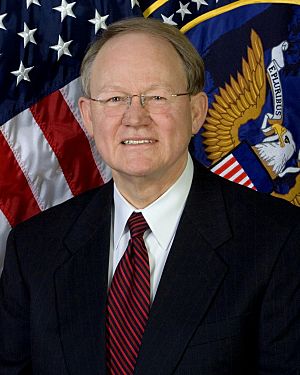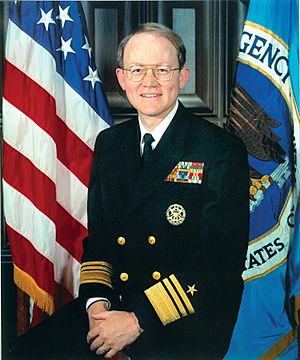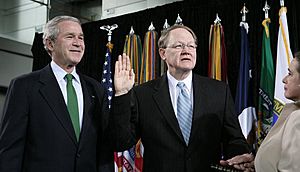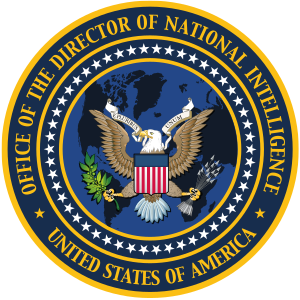Mike McConnell (U.S. Naval officer) facts for kids
Quick facts for kids
Mike McConnell
|
|
|---|---|
 |
|
| 2nd Director of National Intelligence | |
| In office February 20, 2007 – January 27, 2009 |
|
| President | |
| Preceded by | John Negroponte |
| Succeeded by | Dennis C. Blair |
| Director of the National Security Agency | |
| In office May 1992 – February 1996 |
|
| President | |
| Preceded by | Bill Studeman |
| Succeeded by | Kenneth Minihan |
| Personal details | |
| Born | July 26, 1943 Greenville, South Carolina, U.S. |
| Education |
|
| Military service | |
| Allegiance | |
| Branch/service | |
| Years of service | 1967–1996 |
| Rank | Vice Admiral |
| Battles/wars | |
| Awards |
|
J. Michael "Mike" McConnell (born July 26, 1943) is a former vice admiral in the United States Navy. He held important roles in the U.S. government. From 1992 to 1996, he was the head of the National Security Agency (NSA). Later, from February 2007 to January 2009, he served as the United States Director of National Intelligence. This job involves overseeing all the different intelligence agencies in the U.S. As of July 2025, he is the Vice Chairman at Booz Allen Hamilton, a large consulting company.
Contents
Early Life and Education
Mike McConnell was born and grew up in Greenville, South Carolina. He finished high school in 1964. He then went to North Greenville Junior College and later earned a bachelor's degree in Economics from Furman University. He also has a master's degree in Public Administration from George Washington University. He studied at the National Defense University and the National Defense Intelligence College. McConnell is married to Terry McConnell. They have four children and nine grandchildren.
Military and Intelligence Career
McConnell joined the United States Navy in 1967. He became an Intelligence Officer. This means he worked with secret information to help the military. During the Gulf War and when the Soviet Union broke apart, he was the main intelligence officer for top military leaders. He helped improve how intelligence agencies shared information with soldiers during the Gulf War.
From 1992 to 1996, McConnell was the Director of the National Security Agency (NSA). The NSA is a government agency that collects and analyzes foreign communications and protects U.S. government information systems. He led the NSA as it changed to deal with new threats after the Cold War ended. Under his leadership, the NSA provided important intelligence and security services to the White House, Congress, and other government groups.
In 1996, McConnell retired from the Navy as a vice admiral. He had served for 29 years. He received many high awards for his service. He also led the Intelligence and National Security Alliance, a group that helps connect people in the intelligence community.
McConnell became the second person to be the Director of National Intelligence (DNI). President George W. Bush chose him for this role in 2007. He was sworn in on February 20, 2007. His appointment was widely supported by politicians from different parties.
Before becoming DNI, McConnell worked as a Senior Vice President at Booz Allen Hamilton. This company provides advice on intelligence and national security. He also chaired the board of the Intelligence and National Security Alliance. This group helps leaders in government, industry, and schools share ideas about intelligence and national security.
In August 2007, McConnell visited Texas to check on border security. He gave an interview to the El Paso Times newspaper. He spoke openly about topics like changes to the Foreign Intelligence Surveillance Act. He asked the reporter to consider if enemies of the U.S. could use the information he shared. The newspaper decided to publish the full interview.
On January 24, 2009, it was announced that McConnell would return to Booz Allen as a Senior Vice President.
Initiatives as Director of National Intelligence
After becoming DNI, McConnell started several plans to improve how U.S. intelligence agencies work together.
100 Day Plan for Integration and Collaboration
Two months after taking office, McConnell created a "100 Day Plan for Integration and Collaboration." This plan aimed to help the U.S. Intelligence Community (IC) work as one team. It focused on six main areas:
- Creating a culture where agencies work together.
- Improving how intelligence is collected and analyzed.
- Getting better technology and equipment.
- Modernizing how the agencies do business.
- Sharing information faster and more easily.
- Making the DNI's powers clearer.
500 Day Plan for Integration and Collaboration
The 100 Day Plan was a quick start. A "500 Day Plan" was then created to keep the improvements going. This plan started in August 2007. It had 10 main goals and 33 supporting goals. These goals were based on the same six focus areas as the 100 Day Plan. Some of the top goals included:
- Treating diversity as very important for the mission.
- Allowing people to work in different intelligence agencies.
- Improving how information is shared.
- Creating a shared environment for all intelligence analysts.
- Setting up a National Intelligence Coordination Center.
- Improving how new equipment is bought.
- Making the security clearance process faster.
- Connecting strategy, budget, and abilities.
- Updating rules to make agency powers clearer.
Director McConnell left office near the 400th day of his 500-day plan.
Updating Foreign Intelligence Surveillance Act (FISA)
In August 2007, McConnell told Congress that the FISA needed to be updated. FISA is a law from 1978 that sets rules for how the government can spy on foreign targets. He said that because technology had changed, intelligence agencies should not need court orders to collect foreign intelligence from targets overseas. He also argued that phone companies should be protected from lawsuits if they helped the government. Congress then passed the Protect America Act of 2007 to update FISA.
McConnell said that FISA was a "foundational law" that protected American rights. He stressed that any changes should still protect privacy while also dealing with foreign threats.
Analytic Outreach
In July 2008, Director McConnell issued a rule for intelligence analysts. It told them to build relationships with outside experts. This was to get more ideas and knowledge on topics important to the intelligence community.
Updating Executive Order 12333
McConnell also worked with the White House to update Executive Order 12333. An Executive Order is a rule issued by the President. This order guides intelligence agencies. McConnell believed the update was needed to include new organizations and technologies. The update aimed to help agencies work better together and deal with threats after the September 11 attacks. In July 2008, President Bush issued Executive Order 13470, which updated 12333.
Information Integration and Sharing
As one of his last actions as DNI, McConnell signed a policy called ICD501. This policy aimed to greatly increase access to databases held by different intelligence agencies. It set rules for when access is not given, with the DNI making the final decision. He also started the Intelligence Information Integration Program (I2P). This program aimed to create shared computer systems and services. The goal was to improve information access, sharing, and teamwork across the U.S. Intelligence Community.
Integrated Planning, Programming and Budgeting System
McConnell led efforts to create a new system for planning and budgeting in the Intelligence Community. Before, each agency made its own budget. After a new policy (ICD106), the Intelligence Community budget was more closely linked to overall goals and performance.
Years After DNI
In April 2010, Admiral McConnell suggested giving the DNI more power. He thought the DNI should have a longer term and oversee a "Department of Intelligence." This would help solve disagreements among different agencies.
On February 12, 2020, Admiral McConnell became the executive director of Cyber Florida. Cyber Florida is an organization at the USF. It works with universities, businesses, government, and the military in Florida. Its goal is to build partnerships and programs to strengthen Florida's cybersecurity industry.
Career Overview
- Served on the USS Colleton in the Mekong Delta, 1967–1968
- Worked for Naval Investigative Service in Japan, 1968–1970
- Commander of Middle East Force Operations, 1971–1974
- Executive assistant to Director of Naval Intelligence, 1986–1987
- Chief of Naval Forces Division at National Security Agency, 1987–1988
- Director of Intelligence for Commander in Chief Pacific Fleet, 1989–1990
- Intelligence director for Joint Chiefs of Staff, 1990–1992
- Director of NSA, 1992–1996
- Senior Vice President at Booz Allen Hamilton, 1996–2006
- Director of National Intelligence, 2007–2009
- Executive Vice President at Booz Allen Hamilton, 2009–2012
- Advisory Board Member of the Council on CyberSecurity, 2013
- Executive Director, Cyber Florida, 2020–present.
 | Toni Morrison |
 | Barack Obama |
 | Martin Luther King Jr. |
 | Ralph Bunche |




